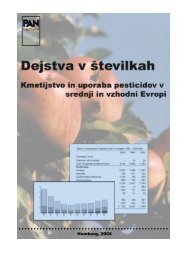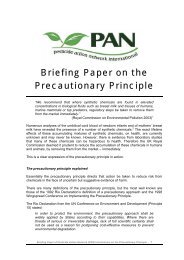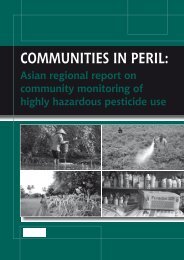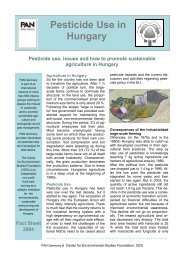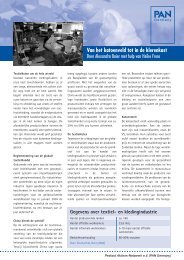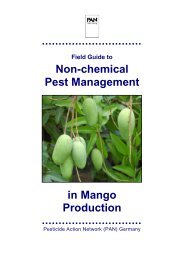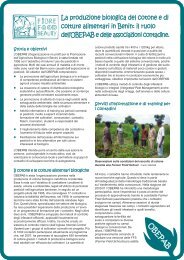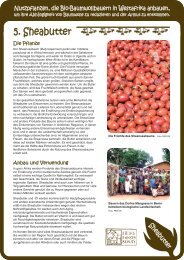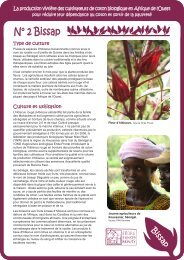Field Guide: How to Grow Crops without Paraquat - Online ...
Field Guide: How to Grow Crops without Paraquat - Online ...
Field Guide: How to Grow Crops without Paraquat - Online ...
You also want an ePaper? Increase the reach of your titles
YUMPU automatically turns print PDFs into web optimized ePapers that Google loves.
<strong>Field</strong> <strong>Guide</strong>: <strong>How</strong> <strong>to</strong> Live and Work Without <strong>Paraquat</strong><br />
C. Category 3: Broadleaf Weeds<br />
Arrowleafed monochoria<br />
Scientific name: Monochoria vaginalis<br />
Synonyms: Heartshape false pickerelweed,<br />
Monochoria, Pickerelweed<br />
Black nightshade<br />
Scientific name: Solanum nigrum<br />
Synonyms: Common nightshade, Deadly nightshade,<br />
Garden nightshade, Wonderberry<br />
Habitat<br />
Irrigated fields<br />
Affected crops<br />
Mostly irrigated rice<br />
Distribution<br />
Worldwide<br />
Description<br />
The stem is slightly erect and fleshy. The leaves are<br />
heart-shaped, shiny, and with rounded bases. The<br />
flower head is clustered and composed of up <strong>to</strong> 25<br />
flowers. The flowers are lilac or violet-blue. The roots<br />
are submerged under water or rooted in the mud and<br />
the rest parts are above the water surface. The plant is<br />
propagated by seeds or whole plants.<br />
Effects and impacts<br />
Monochoria can reduce rice yield as high as 82%,<br />
when left uncontrolled. Sixty individual plants/sq. m.<br />
can reduce yield by up <strong>to</strong> 35%. In India, the plant is<br />
used as vegetable and the roots are used for<br />
medicinal purposes. Studies show that when the<br />
weeds infest some rice fields in South Korea, they are<br />
found <strong>to</strong> be resistant <strong>to</strong> Bensulfuron-methyl.<br />
Methods of control<br />
1. Proper seed selection<br />
2. Regular field moni<strong>to</strong>ring<br />
3. Thorough land preparation by plowing and<br />
harrowing<br />
4. Keeping seedbeds free of weeds<br />
5. Hand weeding<br />
6. Crop rotation<br />
Habitat<br />
Cultivated and disturbed areas with dry and moist soils<br />
Affected crops<br />
<strong>Crops</strong> that belong <strong>to</strong> the nightshade family (<strong>to</strong>ma<strong>to</strong>,<br />
eggplant, pepper, pota<strong>to</strong>), beans, corn, and other<br />
agricultural crops<br />
Distribution<br />
Worldwide<br />
Description<br />
The stem is erect and smooth. The leaves are eggshaped<br />
with wavy margins. The flowers are white <strong>to</strong><br />
pale-blue and arranged in clusters. The berries are<br />
round, green when young and turn black when ripe,<br />
hence the name. The green berries are poisonous. A<br />
nightshade plant can produce as much as 5,000<br />
seeds.<br />
Effects and impacts<br />
Black nightshade is an alternate host of pests found<br />
on corn, <strong>to</strong>ma<strong>to</strong>, eggplant, pepper, pota<strong>to</strong>, legumes,<br />
and other crops. Its seeds are easily mixed with beans<br />
during harvest. The juice of the ruptured seeds stains<br />
and causes the soil <strong>to</strong> stick on the harvested crop. It<br />
also disrupts the harvest operation and lowers the<br />
quality of the produce. The plant is eaten as a<br />
vegetable and for its ripe fruits. It has medicinal<br />
properties, with the leaves, stems and roots used as a<br />
poultice on open wounds, boils, and sores. Studies<br />
show that the Black nightshade weeds become<br />
resistant <strong>to</strong> <strong>Paraquat</strong> on some vegetable fields in<br />
Malaysia and also resistant <strong>to</strong> Atrazine when infesting<br />
some corn fields in Belgium, Czech Republic, Germany,<br />
Italy, New Zealand, Spain, Switzerland, and UK;<br />
cropland in France; and orchards in Poland (Weed<br />
Science, 2005).<br />
•••••••••••••••••••••••••••••••••••••••••••••••••••<br />
20 Pesticide Action Network (PAN) Germany



